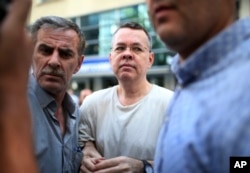A senior U.S. official said Washington is confident a detained American pastor in Turkey will be free soon, as tensions deepen between the two countries.
"On Pastor Brunson, I think there is excellent prospects that he's going to come home," Sam Brownback, U.S. ambassador at large for international religious freedom, said Thursday at the conclusion of three days of State Department talks to advance religious freedom.
Andrew Brunson, an evangelical pastor from Black Mountain, North Carolina, has been jailed in Turkey for nearly two years on terrorism and espionage charges. Earlier this week, Brunson was released from a Turkish prison and placed under house arrest while his trial continues.
His case has strained relations between Turkey and the United States, both NATO allies.
Threatening sanctions
Thursday, U.S. President Donald Trump and Vice President Mike Pence threatened sanctions on Turkey if Brunson is not released.
The warning prompted a sharp response from Turkish Foreign Minister Mevlut Cavusoglu on Twitter.
The State Department said Friday that Secretary of State Mike Pompeo spoke with Cavusoglu the day before, underscoring "it is well past time" for Brunson to come home.
Washington accuses Ankara of hostage-taking in a bid to extract diplomatic leverage, a charge Turkey denies, insisting its judiciary is independent.
The diplomatic disagreement is further escalating amid reports Ankara reneged on a deal to release Brunson as part of the agreement that saw Israel release Turkish citizen Ebru Ozkan, accused of smuggling for Hamas.
A senior Turkish official dismissed the reports as "baseless." However, Trump's strong remarks calling for Brunson's release have led some to suggest there was some kind of agreement.
"I understand the so-called deal is a verbally agreed deal between the two presidents," said former senior Turkish diplomat Aydin Selcen, who served in Washington, "So we are not privy to the details. Maybe both sides did not understand one another well. So the U.S. believed they had a firm deal. But, Ankara believed there was more to deal with, before Brunson's release."
Diplomatic fallout
With Trump weighing in on Brunson's case, analysts say the diplomatic fallout for Ankara could be severe.
"Mr. Trump seems to be the only remaining asset left in D.C. [Washington] for Ankara," Selcen said.
Trump and Erdogan reportedly had developed a good relationship. The U.S. president at this month's NATO summit praised his Turkish counterpart.
"He does things the right way," he said.
At the same time, the U.S. Senate is set to vote on a bill that would seek the restriction of loans by international bodies to Turkey.
"It's mainly symbolic, but important," said political analyst Atilla Yesilada of Global Source Partners.
He said the move would only have limited effect on Turkey, but warns it could be a sign of Washington's intent on how it could punish Turkey.
"Never mind these various sanction bills," he continued. "Just a few telephone calls from the American Treasury to large American banks to hold back on new loans to Turkey's counterparts or not to underwrite bonds would cause significant damage to an already extremely fragile Turkish economy."
Turkey is heavily dependent on foreign capital to sustain its economy.
But Turkey has leverage of its own. U.S. forces are reliant on Ankara for regional operations at the large Incirlik Turkish airbase. Washington is also looking for Turkish cooperation in enforcing Iranian sanctions.
Analysts say Turkey also uses Washington's concerns over its deepening relationship with Russia as leverage. Washington is lobbying Ankara to abandon a purchase of Russian S-400 missiles.








